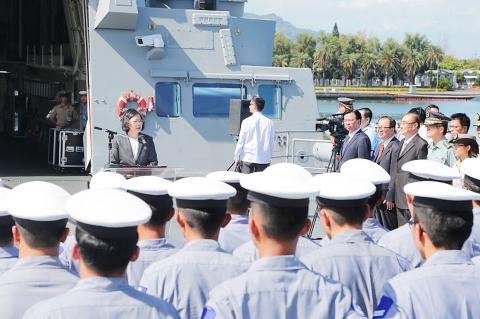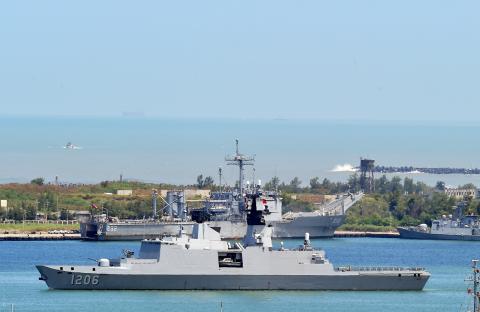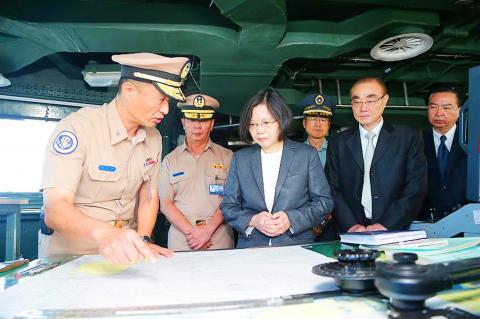President Tsai Ing-wen (蔡英文) yesterday vowed to demonstrate the nation’s determination to safeguard its national interests as she boarded a Kang Ding-class frigate at the naval port in Kaohsiung’s Zuoying District (左營) ahead of its mission in the disputed South China Sea.
“Today [Wednesday], the Kang Ding-class frigate Dyi-huah is to embark on a patrol mission in the South China Sea,” Tsai said in a morning speech to the crew of the frigate. “The mission was moved forward by one day and carries particular significance, as new developments occurred in the region yesterday [Tuesday].”
Tsai said a ruling handed down by the Permanent Court of Arbitration in The Hague, Netherlands, on Tuesday, especially the part pertaining to Itu Aba Island (Taiping Island, 太平島), constituted a severe impairment of the nation’s rights regarding its islands and territorial waters in the South China Sea.

Photo: courtesy of the Ministry of National Defense
“This frigate represents the Republic of China. The uniforms you wear represent the public’s trust in you,” Tsai said. “As for this mission, it is aimed at demonstrating Taiwanese determination to defend our national interests.”
A paragraph in the court’s ruling states that all of the high-tide features in the Spratly Islands (Nansha Islands, 南沙群島) — which Taiwan claims — including Itu Aba, are legally “rocks” that do not generate an exclusive economic zone or continental shelf.
The government has refused to recognize the ruling and deemed it as having no legal effect on the nation on the grounds that Taiwan was not invited to participate in the arbitration process, nor was it consulted about its opinions.

Photo: Chang Chung-yi, Taipei Times
Tsai’s presence on the warship was apparently prompted by the downgrading of Itu Aba, the largest naturally occurring island in the Spratly Islands, which has been administered by Taiwan since 1956.
It is also claimed by Vietnam, the Philippines and China.
The president was accompanied by National Security Council Secretary-General Joseph Wu (吳釗燮), Minister of National Defense Feng Shih-kuan (馮世寬), Chief of General Staff Yen De-fa (嚴德發), National Security Council Deputy Secretary-General York Chen (陳文政) and Naval Commander Huang Shu-kuang (黃曙光).

Photo courtesy of the Ministry of National Defense
Tsai said that it has been the nation’s long-standing stance that South China Sea disputes should be settled peacefully via multilateral negotiations.
“On the foundation of equal negotiations, we are also willing to join hands with other parties to promote peace and stability in the region,” Tsai said.
The president urged the armed forces to strive for their dignity, which she said does not fall from the sky, but must be earned gradually through implementation of discipline and development of professionalism.
“Now, a greater mission has fallen upon your shoulders,” Tsai said, urging the navy to put its skills to use and sail to the South China Sea to safeguard the nation’s interests.

CHAOS: Iranians took to the streets playing celebratory music after reports of Khamenei’s death on Saturday, while mourners also gathered in Tehran yesterday Iranian Supreme Leader Ayatollah Ali Khamenei was killed in a major attack on Iran launched by Israel and the US, throwing the future of the Islamic republic into doubt and raising the risk of regional instability. Iranian state television and the state-run IRNA news agency announced the 86-year-old’s death early yesterday. US President Donald Trump said it gave Iranians their “greatest chance” to “take back” their country. The announcements came after a joint US and Israeli aerial bombardment that targeted Iranian military and governmental sites. Trump said the “heavy and pinpoint bombing” would continue through the week or as long

TRUST: The KMT said it respected the US’ timing and considerations, and hoped it would continue to honor its commitments to helping Taiwan bolster its defenses and deterrence US President Donald Trump is delaying a multibillion-dollar arms sale to Taiwan to ensure his visit to Beijing is successful, a New York Times report said. The weapons sales package has stalled in the US Department of State, the report said, citing US officials it did not identify. The White House has told agencies not to push forward ahead of Trump’s meeting with Chinese President Xi Jinping (習近平), it said. The two last month held a phone call to discuss trade and geopolitical flashpoints ahead of the summit. Xi raised the Taiwan issue and urged the US to handle arms sales to

State-run CPC Corp, Taiwan (CPC, 台灣中油) yesterday said that it had confirmed on Saturday night with its liquefied natural gas (LNG) and crude oil suppliers that shipments are proceeding as scheduled and that domestic supplies remain unaffected. The CPC yesterday announced the gasoline and diesel prices will rise by NT$0.2 and NT$0.4 per liter, respectively, starting Monday, citing Middle East tensions and blizzards in the eastern United States. CPC also iterated it has been reducing the proportion of crude oil imports from the Middle East and diversifying its supply sources in the past few years in response to geopolitical risks, expanding

Pro-democracy media tycoon Jimmy Lai’s (黎智英) fraud conviction and prison sentence were yesterday overturned by a Hong Kong court, in a surprise legal decision that comes soon after Lai was jailed for 20 years on a separate national security charge. Judges Jeremy Poon (潘兆初), Anthea Pang (彭寶琴) and Derek Pang (彭偉昌) said in the judgement that they allowed the appeal from Lai, and another defendant in the case, to proceed, as a lower court judge had “erred.” “The Court of Appeal gave them leave to appeal against their conviction, allowed their appeals, quashed the convictions and set aside the sentences,” the judges